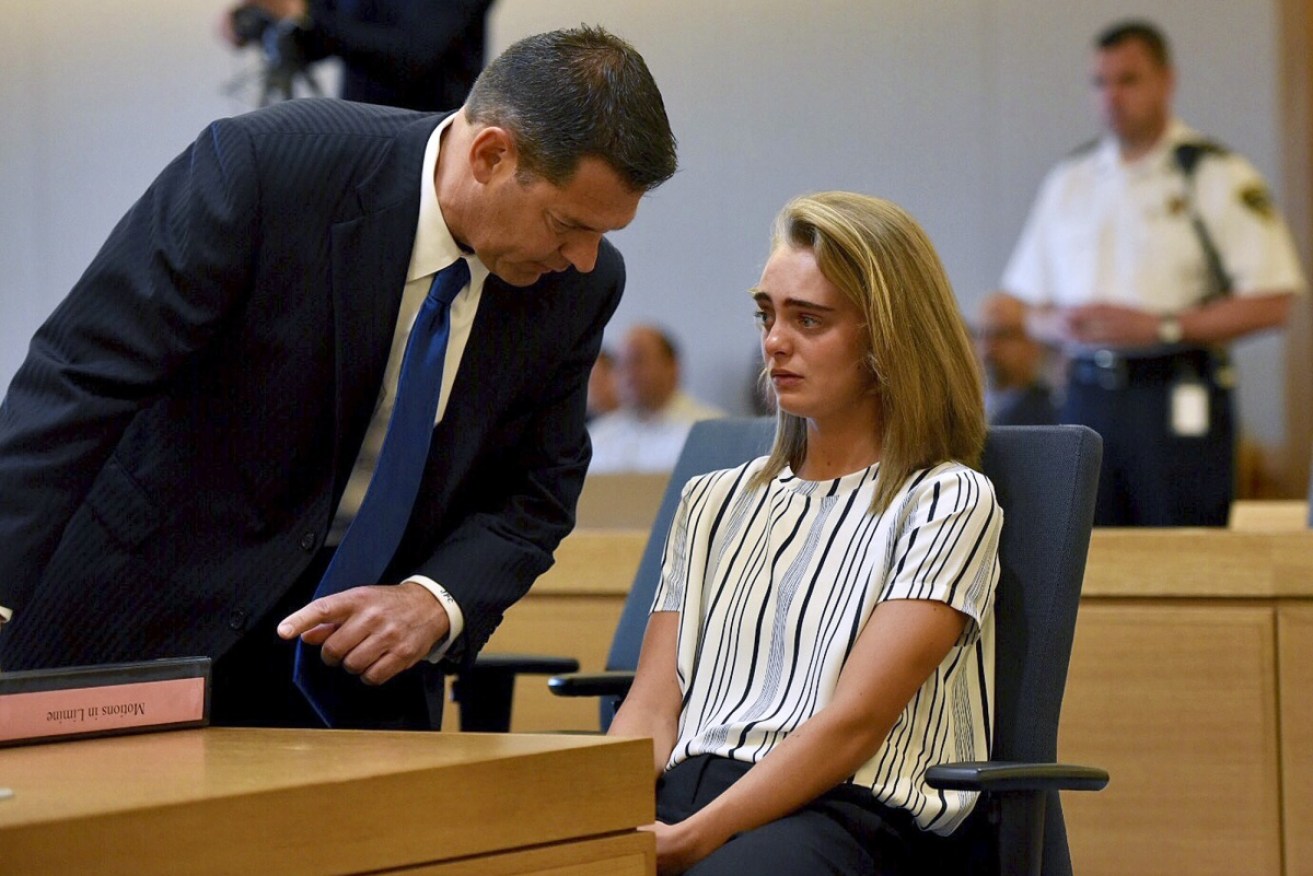‘You need to just do it’: Woman on trial for chilling pre-suicide texts

Michelle Carter appeared distressed during her trial for involuntary manslaughter. Photo: AAP
The teenagers shared mundane text messages — about a walk and a trip to get ice cream. But there were darker ones, too.
“It’s time, babe,” Michelle Carter, then 17, texted to her boyfriend, Conrad Roy, who had just texted that he was “ready”.
“You know that,” she wrote. “When you get back from the beach you’ve gotta do it. You’re ready.”
“Okay, I will,” Mr. Roy, 18, typed back, adding, “No more thinking.”
“Yes, no more thinking,” Ms. Carter wrote. “You need to just do it.”
Ms Carter, now 20, is on trial in the US on a charge of involuntary manslaughter in the death of Mr Roy, who was found dead in his truck in 2014, after that exchange of text messages, more texts and two phone calls.
His death was deemed a suicide, but prosecutors say Ms Carter was to blame.
The case against Ms Carter is not without precedent, but such cases are rare and raise unusual challenges for prosecutors: To what extent can one person be responsible — and criminally liable — for the suicide of another person?
Ms Carter’s lawyers, and other civil liberties advocates, have noted in legal filings that Massachusetts, unlike many other states, has no law against encouraging someone to commit suicide and have said prosecutors are stretching the definition of involuntary manslaughter.
Complicating matters in this case is the fact that Ms Carter and Mr Roy, who seemed to be in nearly constant communication and often wrote that they loved each other, rarely met in person.
Their relationship unfolded mostly in expressive text messages, and the case could well turn on questions about the power of those words.
As the trial began in Taunton on Tuesday, Maryclare Flynn, a prosecutor, told Judge Lawrence Moniz that Ms Carter essentially caused Mr Roy’s suicide, pointing repeatedly to text messages that seemed to urge Mr Roy to take his life.
“Just park your car and sit there and it will take, like, 20 minutes,” Ms. Carter wrote. “It’s not a big deal.”
It did not stop with text messages, Ms Flynn said. With the suicide plan in motion, Mr Roy at one point got out of the car, apparently feeling fear, the prosecutor said. But in a phone call, Ms Carter “ordered him back in and then listened for 20 minutes as he cried in pain, took his last breath, and then died,” Ms Flynn said.
Prosecutors say Ms Carter was driven by a hunger for attention from her peers in Plainville, Mass. She got attention when she talked about her suicidal boyfriend, Ms Flynn said, and risked that her peers would think she was lying if he did not follow through.

Prosecutors say Ms Carter used her boyfriend as a pawn in her “sick game”. Her lawyers say she too was troubled. Photo: AAP
“She used Conrad as a pawn in her sick game of life and death,” Ms Flynn said.
But Ms Carter’s defense lawyer portrayed Mr. Roy as a depressed teenager who had attempted suicide before, planned his death and chose to end his life on his own.
Joseph Cataldo, the lawyer, said that Mr Roy had done hundreds of online searches relating to suicide and that Ms Carter had, at earlier points, suggested that Mr Roy seek help.
He described Ms Carter as a vulnerable teenager, too, saying she had suffered from an eating disorder, had been treated in a psychiatric hospital and was impaired by the side effects of an antidepressant.
“She was dragged into this,” Mr Cataldo said, adding, “There was no infliction of harm by Michelle Carter, who was 30 miles away.”
Through the first day of a trial that is expected to take as long as two weeks, Ms Carter leaned slightly to the side in her chair, occasionally whispering to Mr Cataldo. She had filled a page of a legal pad with notes.
At the request of Ms Carter’s lawyers, her case will be decided by Judge Moniz, not by a jury. She could face up to 20 years in prison if convicted.
Ms Carter’s lawyers tried to throw out the indictment, but the state’s highest court allowed the case to proceed, citing two cases from the 1960s in which people were convicted of involuntary manslaughter for the self-inflicted deaths of other people. One case involved people who took part in a game of Russian roulette; another involved a man who helped his wife load a gun and offered tips on its use.
Robert Cordy, a Supreme Judicial Court justice, acknowledged that Ms Carter’s case was the first involuntary manslaughter indictment the court had considered “on the basis of words alone”.
– New York Times
- If you are troubled by anything you’ve read in this report, help is available. Call Lifeline on 13 11 14 or beyondblue on 1300 22 4636.






